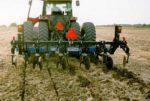Advertise Follow Us
Articles Tagged with ''USDA''
Climate Corps or Peace Corps: Let No-tillers' Hard Work Shine
Conservation educators should come from within the no-till community rather than from young people without first-hand experience
Read More
[Video] What No-Tillers Should Know about USDA’s Climate-Smart Data Collection
In this episode of the No-Till Farmer podcast, brought to you by Yetter Farm Equipment, Todd Janzen, ag attorney at Janzen Schroeder Ag Law explains what no-tillers need to know about the USDA’s data collection through these grants, potential legal liabilities for artificial intelligence in agriculture and more.
Read More
[Podcast] What No-Tillers Should Know about USDA’s Climate-Smart Data Collection
In this episode of the No-Till Farmer podcast, brought to you by Yetter Farm Equipment, Todd Janzen, ag attorney at Janzen Schroeder Ag Law explains what no-tillers need to know about the USDA’s data collection through these grants, potential legal liabilities for artificial intelligence in agriculture and more.
Read More
No-Till Innovator Awards
No-Till Innovators Passionate about Sharing Soil-Saving Practices
Indiana’s Mike Starkey, roller crimper inventor Jeff Moyer, Case IH dealer H&R Agri-Power & nonprofit Conservation Technology Information Center named 2023 No-Till Innovators
Read More







